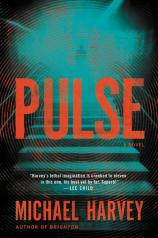Pulse
Review
Pulse
As he works to mold and perfect the details of the shooting of a homicide suspect, Boston detective William Barkley “Bark” Jones seeks guidance from the medical examiner. “So I did the right thing?” he asks. “You did the cop thing,” the examiner assures him.
Michael Harvey’s eighth novel, PULSE, marks the award-winning journalist’s return to Boston, where he grew up. His first six books are set in his adopted and current hometown of Chicago. Whether it’s Beantown or Chi-Town, these titles share common themes --- crime, gritty streets, and characters living in unflinching urban communities.
"In a vivid narrative, Harvey captures the Boston of the mid-’70s, where racial protests and battles were prevalent as the city struggled to face court-ordered desegregation of its school system through the busing of students between white and black neighborhoods."
PULSE takes place in 1976 and is loosely based on an actual event from that year: the murder of Andy Puopolo in Boston’s Combat Zone. Andy was a star football player at Harvard, and his death was one of the city’s most notorious crimes of the ’70s. In Harvey’s treatment, the murder victim is Harry Fitzsimmons, but the focus is on his younger brother, Daniel, who is 16 and living totally on his own after the death of his parents. When Daniel was eight years old, his mother perished in a car crash. He was in the vehicle at the time and lapsed into a coma. After awakening, Daniel was able to do some strange and different things. He can get inside people’s heads and influence behavior. Throughout the book, he must wrestle with this unusual power that will impact his ability and that of the police to investigate his brother’s murder.
In a vivid narrative, Harvey captures the Boston of the mid-’70s, where racial protests and battles were prevalent as the city struggled to face court-ordered desegregation of its school system through the busing of students between white and black neighborhoods. As a youth, Harvey attended Boston Latin School, the oldest and first public school in America. Daniel and his fellow classmates are typical high school students, realistically portrayed by Harvey. Although Daniel has been living with Harry in Cambridge, he continues to attend Boston Latin. To avoid paying tuition, he must find a new residence closer to his school. That’s when he meets Simon Lane, a quirky physics professor who tells him, “I focus on a phenomenon known as entanglement.” The theory involves invisible pulses of light and energy that can be harnessed by the human mind. This supernatural subplot adds an element of fantasy to the novel that makes for an entertaining pairing.
Ultimately, though, PULSE is simply a great police procedural. Jones and his partner, Tommy Dillon, are the Boston officers who catch the Fitzsimmons murder. They fit the standard formula often present in urban police procedurals. Jones is black, Dillon is white. Dillon is married, a recovering drug addict whose addiction was covered up by his partner to allow him to continue working. Jones is the officer many will recognize, a good cop who is often troubled by the dark side of his job. Jones and Dillon share many parts of their work, not the least being that they owe each other their lives. Harvey gives readers all the elements of a murder puzzle: drugs, money, corruption and the civil unrest of the ’70s. Those who recall this decade will exalt in references to Yaz, Bobby Orr, Aerosmith and Gladys Knight.
PULSE is a wonderful crime novel painted on a ’70s canvas. As a Chicago guy, I do hope that Michael Harvey returns his stories to my hometown, but my occasional trip to Boston is still quite enjoyable.
Reviewed by Stuart Shiffman on November 2, 2018




